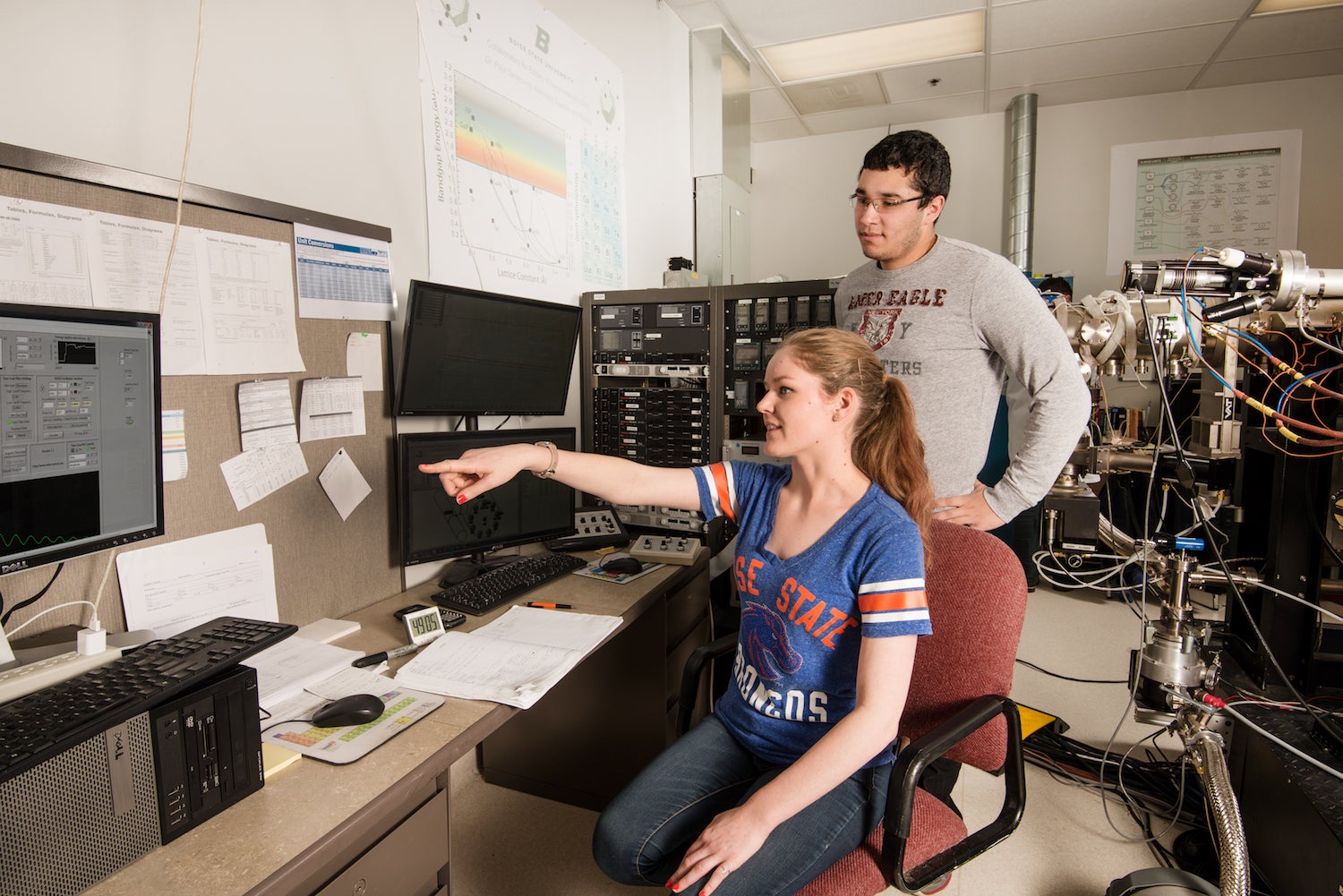The National Science Foundation (NSF) annually recognizes and supports outstanding graduate students who intend to pursue research-based master’s and doctoral degrees by awarding Graduate Research Fellowships and Honorable Mentions. This year, eight Boise State students and alumni were honored among the nation’s most innovative and promising young minds.

Current Boise State students Tanya Lu, an electrical and computer engineering major, and Trent Garrett, a physics major with an emphasis in applied physics, each were offered fellowship awards. These prestigious awards include a three-year annual stipend of $34,000 and a $12,000 allowance for tuition and fees, as well as opportunities for international research and professional development. Both Lu and Garrett will graduate in May.
The NSF Graduate Research Fellowship Program is the country’s oldest fellowship program that directly supports graduate students in various STEM fields.
Two alumna also were awarded fellowships: Cecelia Staggs (BA, English linguistics and Spanish, ‘19), currently a student at the University of Oregon in Eugene, and Ashlee Webb (BS, biology and psychology, ’18), currently a student at Indiana University.
In addition, alumni Andrew Bogard (BS, physics, ’18), John Paustian (BS, geosciences ‘19), Cierra Abellera (BS, psychology, ‘19) and Joel Johnson (BS, geosciences, ’19) all received honorable mentions.
With his fellowship, Garrett is eager to pursue his doctoral degree in electrical engineering from the University of Texas (UT) at Austin. With UT mentoring professor Dan Wasserman, Garrett will build upon the research he conducted at Boise State with the Collaboratory for the Epitaxy of Nanomaterials to build devices that emit in the mid-infrared region of the electromagnetic spectrum.
“My love of this research comes from the potential that it has to improve many existing and future devices,” Garrett said. “In addition, the reliance that these structures have on quantum physics continues to draw me further into this field of science. I’m constantly amazed how properties from quantum physics can be applied to predict the nature of electrons within quantum dots.”

Garrett credits both the Boise State faculty and student mentors who have influenced his research, supported him and helped shape his education. His mentors include assistant professor of physics Paul Simmonds, Christopher Schuck (Ph.D., materials science and engineering, ’19), and current doctoral candidates Kevin Vallejo and Katie Sautter.
Lu, who came to Boise State from Jiangxi, China, to complete her bachelor’s degree, will start her doctoral degree in electrical engineering at the University of Michigan, Ann Arbor, this fall. There, she will be working with professor Becky Peterson.
“It’s a five-year program but I’m hoping to finish in four years,” Lu said. While pursuing her doctoral degree, Lu will be engaging in research with electronic devices, specifically metal oxide thin film transistor devices.
“Those transistors are the fundamental building block for most of our electronics now. For thin-film transistors, it’s used in portable and desktop computers, high-resolution TVs, tablets and smartphones,” explained Lu. “I think this is a very valuable area that we need to keep doing research on to benefit more people, because our life is so reliant on them.”

Both students expressed their gratitude at the undergraduate support from scholarships that helped them to progress to this pivotal stage. Lu receive multiple scholarships, including the Kem Gardner Scholarship and the Robert and Barbara Dargatz Award, which empowered her to focus on her research instead of working three jobs. She hopes to have the opportunity to provide for future students in the same way.
“I really, really appreciate those scholarship donors, that’s actually why I’m able to finish my bachelor’s degree on top of my research activities/involvement. I really do want to become one of them in the future, so I can pass on this to future students,” said Lu.
Garrett received funding from the Idaho Opportunity Scholarship to support his education at Boise State. He also highlighted the support of the McNair Scholars program as critical to his success in winning the NSF fellowship,
“There is no doubt in my mind that had I not been part of McNair, I wouldn’t have received this award from the NSF. The McNair program provided a lot of guidance in applying for this grant, specifically with how to structure the essays that went into our application,” said Garrett.
Support came not only from scholarship and mentors, but also family and friends, fellow students and caring campus staff.
“I’d like to thank all the members in CEN for allowing me to be part of this exciting research, Sarah Ritter, the McNair program coordinator, for the countless hours of support she gave me, TRIO director Gregory Martinez for securing the funding for McNair that has allowed me to receive help from Sarah, and my mom for supporting me my whole life and pushing me to achieve a higher education,” said Garrett.
“I’d really want to thank my dad, he’s actually my step-dad,” said Lu. “But he’s been loving me and taking care of me as his own daughter. That really gave me the confidence to stay in Boise to pursue my engineering [dream] I had since I was a little girl. Also, I’d like to thank my mom, who really showed me how to work hard, be respectful, and give back to the community. If not for her, I wouldn’t be the person I am today.”